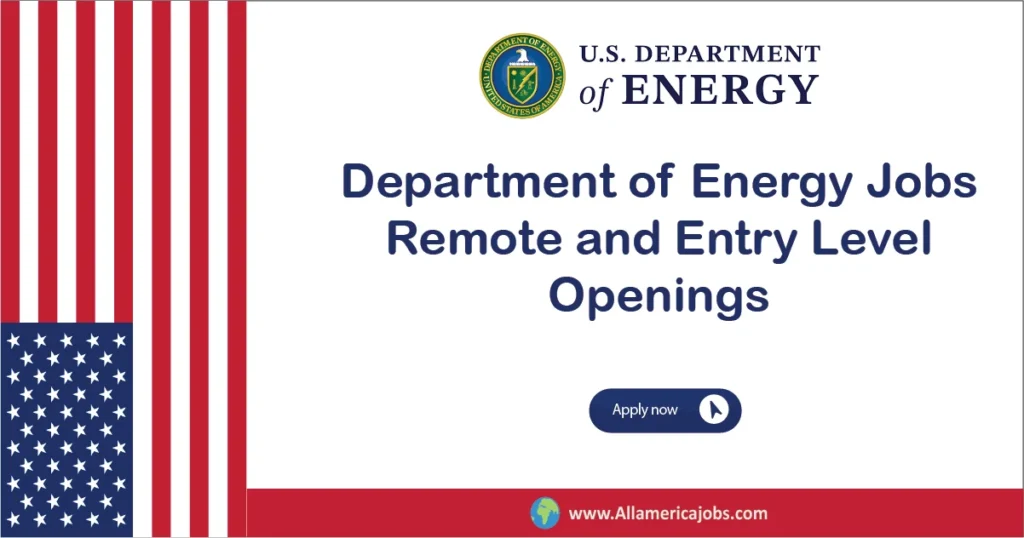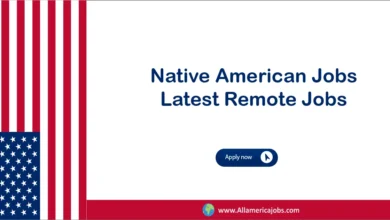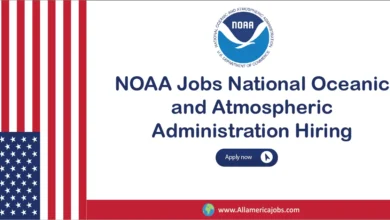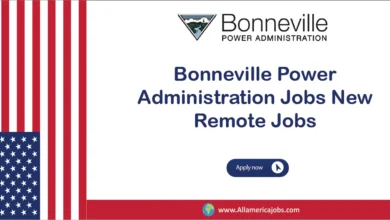Department of Energy Jobs | Remote and Entry Level Openings
The U.S. Department of Energy presents a wealth of opportunities for those looking to make an impact in clean energy, national security, research, and innovation. If you’re driven by purpose and technical challenge, exploring Department of Energy Jobs opens doors to meaningful work—all across America. Whether you’re a recent graduate, a mid-career professional, or an expert in your field, Department of Energy Careers allow you to contribute to pressing issues such as climate change, renewable energy deployment, and cutting-edge scientific discovery.
When you pursue Department of Energy Vacancies, you’re stepping into a world where professional growth meets public service. From labs to policy offices, every role supports huge-scale change. If you want a job that’s more than just a paycheck—one where your work can help shape the future of energy and technology—your future career begins here!
| Government Name: | Department of Energy |
| Job Location: | Washington, D.C, United States |
| Job Type | Full-time, Part-time, Internships |
| Publishing Date | 3rd Oct, 2025 |
Department of Energy Jobs | Latest GOVT Jobs in USA

About Department of Energy
The U.S. Department of Energy (DOE) was established in 1977 to address the nation’s energy, environmental, and nuclear challenges through innovation, technology development, and energy conservation. It encompasses a wide range of responsibilities—including oversight of the national labs, energy policy, nuclear safety, and energy efficiency. DOE operates programs and facilities across all 50 states. Its regional labs and field offices ensure localized implementation of research, energy infrastructure, and environmental programs.
Through its sub-offices—such as the Office of Energy Efficiency & Renewable Energy (EERE), Fossil Energy & Carbon Management, and the Office of Policy—DOE’s work spans scientific discovery, technology commercialization, regulation, and workforce development. It also works in collaboration with universities, industry partners, and local governments.
Work Culture at Dept of Energy Jobs
DOE’s work culture emphasizes innovation, collaboration, and integrity. Employees often find themselves at the intersection of science, public policy, and technology. Training and continuing education are encouraged, especially for technical roles and research positions. For many DOE offices, work flexibility—including remote/hybrid work—is increasingly common, particularly for roles that aren’t lab- or field-based.
Performance, diversity, equity, and inclusion are central. For example, DOE values veterans, people with disabilities, and under-represented communities. Respect for ethical norms is strong—conflicts of interest are taken seriously, and many positions require security clearances or ethics disclosures. In Gulf regions or international collaboration contexts, DOE sometimes engages with local partners and adheres to regional norms (e.g. for travel, local hiring, environmental and social standards), but for U.S. based DOE Jobs, U.S. federal rules and regulations apply.
Interview Tips for Department of Energy Jobs
Here are six practical tips to help you succeed when you apply or interview for Department of Energy Careers:
- Thorough Research: Understand the specific DOE office you’re applying to (e.g. EERE, Fossil Energy, National Labs). Know their recent projects, priorities (renewables, grid modernization, energy equity), and any recent legislation or initiatives that affect them.
- Tailor Your Resume: Use the federal resume format if required (via USAJOBS). Highlight technical or scientific skills (if applicable), project outcomes, and any prior experience with government, labs, or regulated environments. Include measurable achievements.
- Prepare for Behavioral & Technical Questions: You might be asked about past projects, teamwork, problem solving, but also role-specific questions (e.g. engineering, lab safety, policy analysis). Be ready to describe both your technical competence and how you collaborate.
- Dress Code & Professionalism: Even if the interview is virtual, present yourself professionally. For in-person interviews, business casual is often acceptable but check the role. Be punctual and test technology in advance for remote interviews.
- Understand Eligibility and Clearance Requirements: Some DOE positions (especially in policy, national security, labs) require U.S. citizenship, security clearances, or specific educational credentials. If you have dual citizenship, foreign education, or need a visa, check whether that is acceptable.
- Follow Up & Be Patient: The federal hiring process can be lengthy. After you submit your application (e.g. via USAJOBS), it might take weeks to months before hearing. Send a polite thank-you after interviews. Use the application tracking systems properly.
Salary & Benefits
Here are some sample roles with typical monthly salary (converted approximately from annual / federal GS pay scales) and common benefits you can expect with Department of Energy Jobs in the USA:
| Role | Approx. Monthly Salary* | Typical Benefits |
| Research Scientist / Engineer (GS-12/13) | USD $8,000-$11,000 (depending on location & locality pay) | Health, dental, vision insurance; retirement (FERS); sick/annual leave; telework; training & conferences. |
| Program Analyst / Policy Analyst | USD $7,500-$10,500 | Similar benefits; possible travel; performance bonuses; opportunities to lead projects. |
| Lab Technician / Field Engineer | USD $5,000-$7,500 | Hazard pay (if applies), overtime or shift differential; safety training; job-specific certifications. |
| Contract Specialist / Procurement Officer | USD $9,000-$12,000 | Contracting benefits; professional development; occasional mobility or relocation support. |
| Interns / Recent Graduates (Pathways or Fellowships) | USD $3,000-$5,000 (monthly stipend or prorated salary) | Mentorship, networking, training; some benefits depending on appointment type. |
*Salaries vary depending on GS grade, locality pay (e.g. high-cost areas like San Francisco, New York vs rural), experience and role.
Typical Benefits Include:
- Comprehensive health, dental, vision insurance
- Retirement plans (Federal Employees Retirement System, Thrift Savings Plan)
- Generous leave policies: annual leave, sick leave, paid holidays
- Performance incentives / bonuses (where applicable)
- Flexible work schedules / telework options in many roles
- Paid training / professional development / conference attendance
- In some cases relocation reimbursement or special hiring bonuses
Eligibility Criteria
To qualify for Department of Energy Careers / Department of Energy Vacancies, you generally need:
- At least a bachelor’s degree in a relevant field (engineering, physical sciences, environmental sciences, policy, or related fields) for many technical/research or program roles. Some support roles may accept associate degrees or relevant work experience.
- Relevant work experience depending on the level (entry level, mid-career, senior). Past experience in government, labs, or regulated industry is a plus.
- U.S. citizenship is required for many positions—especially those involving national security, classified information, or high clearance requirements.
- Background checks, and in many cases security clearance.
- Strong communication skills; often writing skills are critical (policy roles, grant management, science communication).
- Ability to work in a team, ethical conduct, problem solving, adaptability.
Latest Job Openings
Use the table below to showcase some actual DOE job vacancies. (These are examples—be sure to check the official site for current listings.)
| Job Title | Location | Category | Apply Link |
|---|---|---|---|
| Supervisory Policy Analyst, Office of Policy | Washington, DC | Policy / Workforce Development | Apply Now |
| General Engineer / Physical Scientist (Bilingual‐Spanish) | Territory / Recovery Assistance Program | Engineering / Science | Apply Now |
| DOE Clean Energy Corps Positions | Various – USA | Clean Energy / Innovation | Apply Now |
How to Apply US Department of Energy Jobs?
If you’re interested in applying for US Department of Energy Careers, here’s a clear step-by-step guide:
- Step 1: Visit the official DOE careers portal at energy.gov/careers or the USAJOBS site. For specialized offices like EERE, check their specific pages.
- Step 2: Search for vacancies by keyword, location, or department. Use filters to narrow including by GS level, hiring path (e.g. veterans, career transitioners).
- Step 3: Create or update your federal resume. Make sure to include education, relevant experience, certifications, technical skills. Use metrics and results when possible.
- Step 4: Submit your application by uploading required documents (transcripts, proof of citizenship, etc.). Double check eligibility requirements.
- Step 5: Prepare for possible interviews: behavioral, technical or policy depending on the role. Be ready to discuss previous projects and how you can contribute.
- Step 6: After submitting, monitor your application through USAJOBS or DOE portal. It may take several weeks or more to get a response. Be patient, follow up if appropriate.
FAQs
Q1. What is the hiring process like for DOE careers?
The hiring process usually involves posting the vacancy on USAJOBS, reviewing applicants, selecting eligible candidates, conducting interviews, background checks, and sometimes security clearances. It can take anywhere from several weeks to a few months from application to hiring.
Q2. What benefits do employees receive at the Department of Energy?
Employees are offered comprehensive benefits, including medical, dental, vision insurance; retirement plans like the Federal Employees Retirement System; generous leave (sick, holiday, annual); professional development; and flexible work options in many roles.
Q3. How do I apply for Department of Energy Vacancies?
You apply by finding job announcements through USAJOBS or the DOE careers site, preparing a federal resume, ensuring you meet eligibility requirements, submitting all required documents, and applying before the announcement’s closing date.
Q4. What are the working hours like at DOE?
Working hours depend on the specific job. Some roles are standard federal hours (~40 hours/week), others may have flexible hours or telework/hybrid options. Lab or field roles may require on-site presence and possibly shift work.
Q5. Are DOE Careers good for long-term growth?
Yes. DOE offers many paths for advancement—through performance, technical or managerial tracks, continuing education, project leadership, and mobility across labs, research facilities, or policy offices. If you contribute strongly and learn continuously, there’s significant long-term potential.




